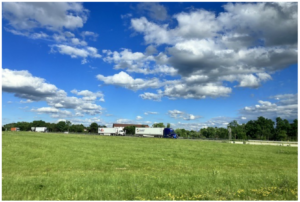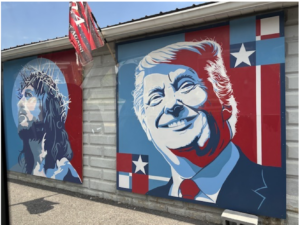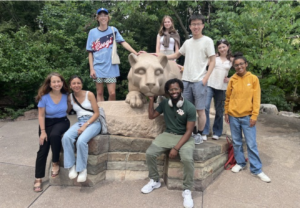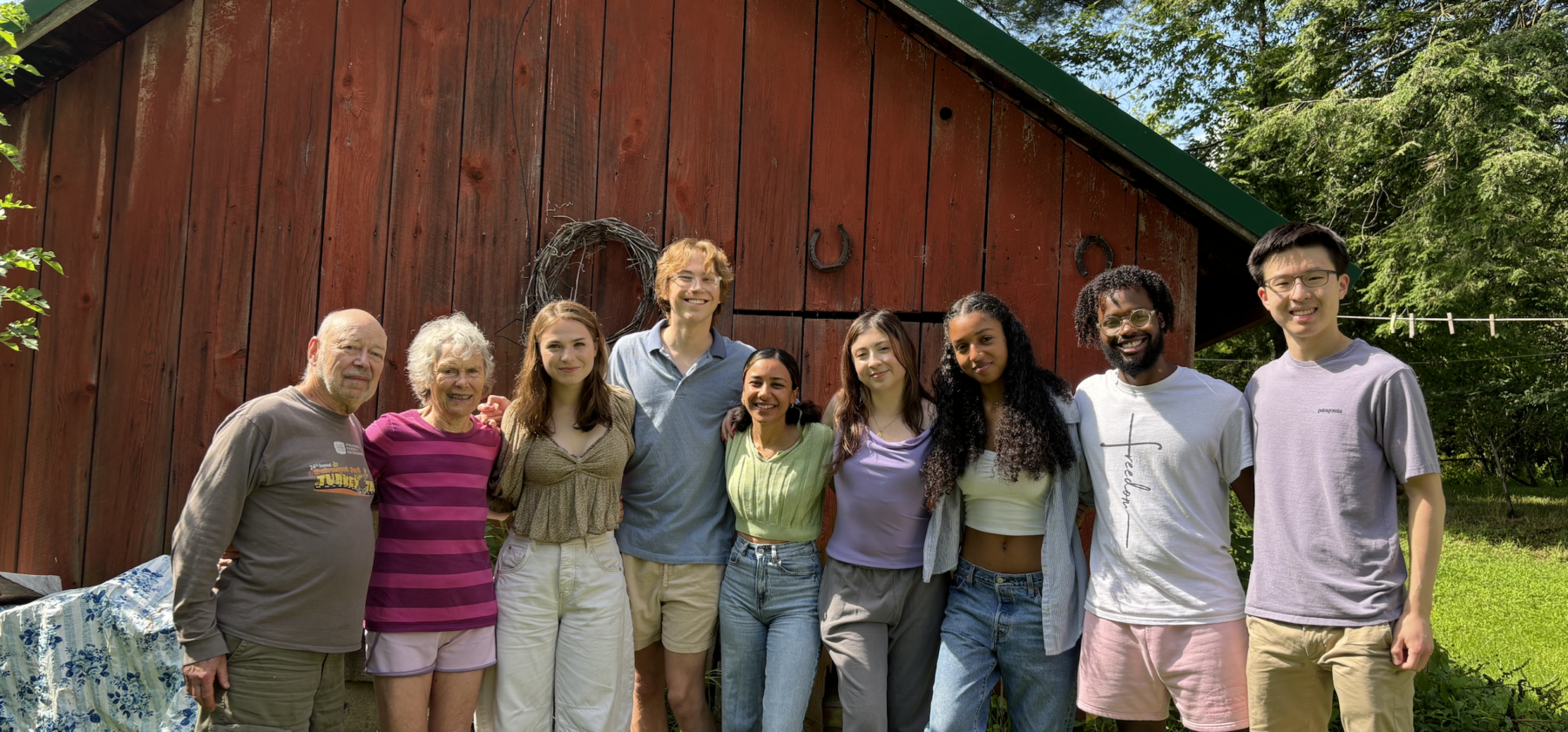The conversation could have taken a dark turn at any moment.
The topic was immigration. One of the speakers had very negative feelings about the influx of foreigners. Another was a first-generation American, the daughter of Moroccan-born parents.
Instead, they kept talking. Soon the man with anti-immigrant beliefs learned that he and the father of the young American worked in the same industry. They’d had similar experiences, dealing with challenging changes within their field. When the conversation was over, all parties left with positive feelings, says Lynn Larabi, the student born to immigrant parents.
“This experience has been transformative and healing … It’s up to humans in general to be more compassionate and kind and to listen because, regardless of experience or views, there are reasons that people respond in the way that they do,” says Larabi, 22, of Philadelphia, a recent graduate of the University of Pennsylvania.
“I think it’s made me realize how human it is to respond with resentment or how human it is to even hold a grudge,” she continues. “Empathy truly is a muscle and it can only be exercised when you let yourself bring your guard down and maybe invite an unpredictable response to shared vulnerability.”
Penn professor Lia Howard wasn’t surprised by the successful outcome of that encounter. For 10 weeks this summer, she and seven student researchers traveled throughout Pennsylvania seeking to connect with people whose political beliefs and life experiences were, in many cases, very different from their own.
“I had a hunch that the students, and me too, could connect with people at a very human level and it 100 percent worked,” says Howard, who is also student advising and wellness director for Penn’s Paideia Program.

In her Political Empathy and Deliberative Democracy class, Howard teaches the concept of “democratic listening,” which “is all about developing attitudes and predispositions necessary for listening towards better understanding people who do not think the way you do.”
The PEL was a chance to put her teachings into action. Penn has pledged funding for the program for another two years. Howard says she’d like to tweak PEL to reach more students.
Democratic listening was a new concept for the student researchers. Noah Kocher, a 19-year-old sophomore from Phoenixville, says his only previous experience with politics was the model U.N. in high school, which he found confrontational and unpleasant.
Now he was being instructed to ask questions of strangers with a framework of the three Bs: Belief, belonging and behavior. Usually, we connect with others based on belief, which can give us a sense of belonging and we don’t think as much about our behavior.
“What we did is put behavior ahead of belief. What if we behave respectfully and interested and we listen to what they say? What if we put that above connecting with them on belief? Does that generate belonging?” Kocher asks. “For political empathy, you ask, How do I extend the same humanity to other people as I give to myself? How do you listen to people as you’d like them to listen to you?”
As a 2020 article in The New Yorker noted, “We expect powerful people to be talkers, not listeners.” But, as author Astra Taylor also notes, we’re designed to listen, as the stoic philosopher Epictetus writes: “We have two ears and one mouth so we can listen twice as much as we speak.”
If only it were that easy. Listening requires practice. “It’s a skill to be cultivated, and when you cultivate it, you feel good about yourself and you get exponentially better at it,” Howard says.
Howard was inspired to follow this path when she was teaching introductory political science at St. Joseph’s University during the 2016 election which unfolded against “a backdrop of intense partisan division and animosity,” as Pew Research noted in June of that year. “Partisans’ views of the opposing party are now more negative than at any point in nearly a quarter of a century.”
Like the nation, the students in Howard’s class were evenly split politically, “a microcosm of the United States.”
“People weren’t listening to each other. I would see students get more agitated and angry as toxic things happened,” she says. “I thought we needed to turn the temperature down by talking to each other. We needed to focus on dialogue along with politics, paying attention to how we talk and listen as we consume information.”
Before joining Penn in March 2020, Howard launched the nonprofit Philadelphia Commons Instituteat Eastern University, a dedicated safe space for political discourse. When funding dried up, she thought about bringing the organization to Penn’s Stavros Niarchos Foundation’s Paideia Program. Launched in 2019, SNF Paideia focuses on wellness, service and citizenship, with an emphasis on informed civil discourse. It was modeled after a similar program at The Johns Hopkins University also funded by SNF. (In 2021, SNF partnered with the University of Delaware on a similar program.)
The Paideia program couldn’t take on the nonprofit, but it was happy to invite Howard back to Penn, where she received her undergraduate degree and Ph.D.
Howard says her Penn students often told her that they couldn’t find others who disagreed with their political beliefs. PEL was a way to get them out of their silos and to meet people with different views. She noted the truth behind Mark Twain’s writing that, “Travel is fatal to prejudice, bigotry, and narrowmindedness …”
“It’s one thing to read about Erie, but it’s another to be in Erie and think about what the people who live there think about,” she says. “[PEL researchers] could not only talk to people, but observe and note the landscape and the area’s geography … and imagine what it would be like to be a citizen of this part of Pennsylvania.”

“People don’t live to troll.”
Before hitting the road, the researchers divided the Commonwealth into seven zones based on media market. They then visited two towns or cities in each zone, including Johnstown, Erie, Scranton and Hazelton. Once in a city, the researchers divided into pairs — with Howard joining a different student each time.
They approached strangers on the streets and in coffee shops, during county fairs and at libraries. They also met with prearranged speakers, including politicians and business leaders. They’d offer their political opinions if asked.
One of the first challenges: deciding the best way to introduce themselves to strangers. The word “politics” could be problematic. Howard says she used the word while introducing herself to a woman in Scranton and “it made her shut down. So one tool I shared is if you see someone recoil for the use of ‘politics,’ try to reframe it to something else. I reframed it right away to ‘issues,’ and what she ended up sharing with me was deeply political.”
Also occasionally offputting was saying, as they were required to, that they were researchers from the Penn in Philadelphia. One person asked Howard if she felt safe where she lived.
“And I said, ‘I don’t know what your media network is telling you about Philadelphia, but it’s a place we adore,’” Howard says. “There are so many siloed stories about place that are false. By visiting other places in the state and encountering other people, you can dissolve the power of false stories or disinformation.”
In another instance, Kocher and Howard visited a Republican Committee headquarters in Cumberland County. When the researchers introduced themselves, the older couple working there “were terrified. The narrative people in a small town have is that people from the city are Democrats there to run them into the ground,” Kocher says. The couple later indicated they got their news from conservative TV channel Newsmax.
The researchers also reminded themselves that they were there to listen, not debate. Junior Natalie Vasquez says she was able to distance her feelings from the conversation and “unlock my curiosity side instead of my judgment side, which is sometimes pretty difficult to do … It’s just having that curiosity and being humble, embracing humility, because your perspective isn’t the only one in the world.”
Penn senior Autumn Cortright believes being a vegan for eight years, and having people scold her for it, prepared her for the differences in opinion she encountered, joking that “I probably experienced more [judgment] at Thanksgivings than I did on the road.” It also reminded her not to judge the people she talked to.
“It’s kind of hard to not have empathy for someone who you’re having a conversation with and they’re a person doing their best,” says Cortright, 21, of Wisconsin. “People don’t live to troll. You’re talking to a living, breathing human who has a life and a community.”
We are all Pennsylvanians
In the 1980s, political consultant James Carville described Pennsylvania as roughly Philadelphia and Pittsburgh with Alabama in-between. In other words, the two cities and their suburbs voted Democrat while the rest of the state voted Republican.

But that assessment fails to note the nuances that the student researchers found this summer. It also puts up barriers that Howard hopes the project addresses.
“I don’t think people in the Philadelphia area, including myself, think of themselves first as Pennsylvanians,” says Howard, noting that for some individuals, self-describing as Pennsylvanian isn’t even the fourth or fifth descriptor they’d use for themselves. “It’s important to be aware of our Pennsylvania identity. We could be better citizens and bring more connectedness to the state.”
Howard noticed that the student researchers tended to have higher opinions of the cities and towns where they felt they’d best connected with people.
“If they had a good conversation in Lancaster, they loved Lancaster,” she says. “Going around the state and building those connections to people and places is so important … If someone says they’re from Erie, we can say we know Erie. We walked the streets there and visited the coffee shop.”
Each of the students interviewed for this article had multiple stories to share about their individual encounters and different takeaways. Kocher recalls going to a fair in Bradford County and talking to a woman from Kenya working the Republican Committee table. She shared that she’d studied cyber security. He said he was studying English. They talked about the impact of artificial intelligence.
She knew Kocher was from Penn and she noted that he came from a very “blue” area. She herself was a supporter of former President Donald Trump and was very anti-abortion.
“Even in past conversations that had been successful positives, I hadn’t felt so comfortable to say what I believed until this moment in rural Appalachia Pennsylvania at the Republican Committee table,” Kocher says. “We had so much connection that I was able to explain how I felt and she was like, Oh, that’s a good point. Then she’d explain … We both felt comfortable to be a bit more honest about our beliefs.”
At that same event, Cortright spoke to a law enforcement officer who described himself as middle of the road leaning conservative, except for the issue of immigration. He said Spanish-speaking “illegals” had come to their town with drugs, working all day, partying all night, then leaving. He also said his brother was killed in a car accident caused by a person who was in the country illegally.
One of the man’s coworkers, listening to the conversation, popped in to add, “I don’t agree with that, but I get along with this guy because that’s how it is in a small town.”
Howard referred to the three Bs Kocher mentioned — belief, belonging, and behavior — noting her theory that listening to people without judging would lead to a sense of belonging.
“I don’t think my beliefs or political views changed during this, but my sense of belonging did, and a feeling of the expansiveness of [the state] did,” Howard says. “I feel connected to more Pennsylvanians, regardless of what we believe.”
Read the full article here.

